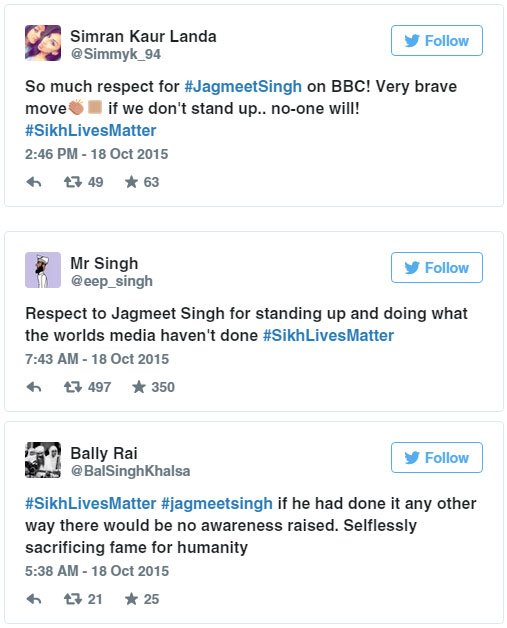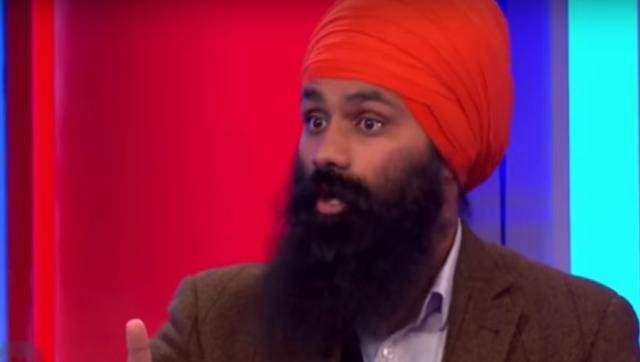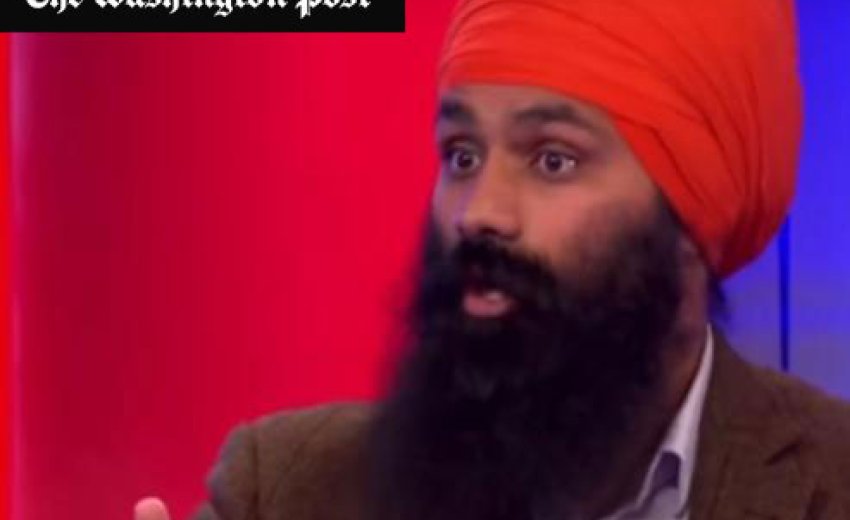This weekend, Jagmeet Singh appeared on "Sunday Morning Live," a popular panel show on the BBC's flagship television channel. Singh, a Sikh activist who was born in Britain, was appearing on the show to discuss interfaith marriages. However, at one point during the segment, he began to talk about something else entirely.
"I have to say Sikhs are being killed in Punjab and no one is reporting it," Singh said directly to the camera, standing up to make his point. "Please report it."
BBC host Sian Williams cut in, sternly telling Singh that he should "show respect" to the other guests on the show. While Singh politely apologized (he appears to have later been removed from the show), his protest quickly proved popular online. On Twitter, many supporters added a hashtag to their messages of approval: #SikhLivesMatter.

To American readers, that hashtag contains an obvious reference. The #BlackLivesMatter movement began in 2013 after the acquittal of George Zimmerman in the shooting death of Trayvon Martin. Over the past two years, it has become a rallying cry for those protesting alleged police brutality against African Americans, with a series of disputed police shootings only adding to the momentum of #BlackLivesMatter over the past year.
The movement has sparked a number of domestic imitators that draw inspiration from it or hope to respond to it, like All Lives Matter or Blue Lives Matter. However, the international aspect of the movement's growth may be its most interesting: As my colleague Ishaan Tharoor noted recently, #BlackLivesMatter protesters have shown increasing solidarity with the Palestinian cause over the past few months.
While there have been examples of prejudice and violence against Sikhs in the United States, Singh's BBC protest wasn't aimed at a problem in the United States or even in Europe. Instead, with his appearance on the BBC, Singh had hoped to highlight the situation in Punjab, India, where two Sikh protesters are said to have died after clashes with the local police. Over the past week there have been protests in the state, where over half of the population is Sikh, after a copy of the Guru Granth Sahib (the Sikh holy scripture which is revered as the living spiritual leader) was found to have been torn and scattered in the street near a Sikh place of worship.
Information from social analytics firm Topsy shows that #SikhLivesMatter first began to gain real traction on Twitter last Wednesday, after the protests spread – the hashtag was shared over 30,000 times in the past seven days. Singh's BBC appearance appears to have re-sparked the debate in Britain, where the Sikh population has been estimated to be around 600,000, with many arguing that the British news organization has not done enough to cover the protests.
Some observers from India and the Sikh diaspora argue that the issue wasn't just the latest deaths but also a broader yet overlooked history of oppression in India that includes the deaths of around 2,800 people in anti-Sikh riots in 1984.
"What Jagmeet did in pushing for coverage of what's going on in Punjab isn't about the deaths that have occurred recently -- it's about something that's been going on for many years," Jasveer Singh Gill, a spokesman for the Sikh Press Association, told the Independent. "For a number of years now, unarmed Sikhs have been killed during peaceful protests. This is what Jagmeet was trying to highlight on the show."

On its Facebook page, Basics of Sikhi, a charity for which Jagmeet Singh works, posted a petition that demanded the BBC report on the situation in Punjab. At the time of writing, the petition has been signed by over 77,000 people (you can view the petition here, but please note it is accompanied by a graphic image). The BBC has responded by saying that it has covered the story online and on radio, as well as on its Hindi-language service.
During a show broadcast on the BBC's Asian Network on Monday, radio host Nihal Arthanayake talked about whether Singh's protest was the right way to go about raising the issues in Punjab, warning at the start that it is a deeply controversial and complicated issue and that the BBC had to cover all sorts of events around the world. Callers to the show expressed a variety of different opinions, with a significant number criticizing Singh.
Singh appeared on the show to defend his stance. Speaking to Arthanayake, he explained that he felt there was a big difference between #BlackLivesMatters and #SikhLivesMatter, which he said were only "slight" parallels. "If an Indian Punjabi police officer fires a lethal bullet . . . that order has to come from the top," he explained. "This is a massive story."
